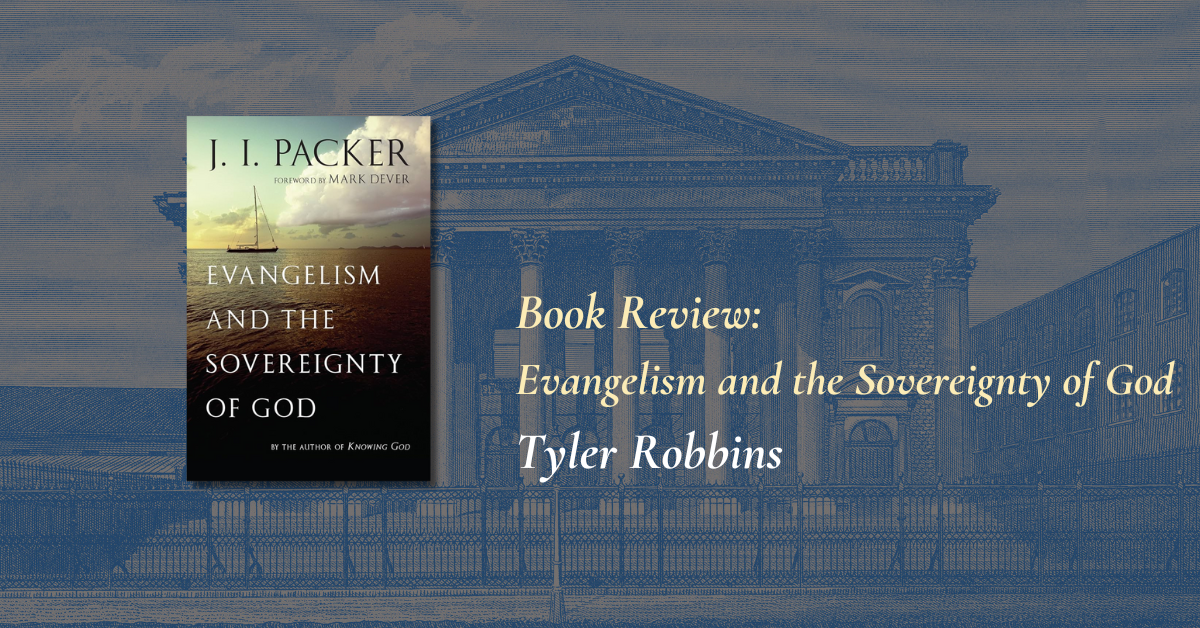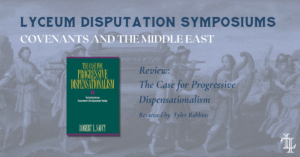Editor’s Note: This book review correlates with the book recommended by Dr. Chuck Lawless in our Q&A for Prospective PhDs Series. If you have not read Dr. Lawless’s article, you can find it here.
James I. Packer was a renowned British theologian and writer, active in the latter half of the 20th century. Perhaps his best-known work is Knowing God. He wrote accessible works for ordinary Christians, and taught theology at Regent College in Vancouver, B.C. for several decades. His little book Evangelism and the Sovereignty of God began as a series of conference addresses in 1959. His aim was “to clarify the relationship between three realities: God’s sovereignty, man’s responsibility and the Christian’s evangelistic duty” (12). He did this in four short chapters.
The first has a simple point—if you are a Christian, then you already believe God is sovereign. “The very fact that a Christian prays is thus proof positive that he believes in the lordship of his God” (18). You instinctively thank God for your own salvation, and you pray for God to save other people (18-20). So, we must get that right in our heads straightaway—we all believe God is sovereign. “What is true is that all Christians believe in divine sovereignty, but some are not aware that they do, and mistakenly imagine and insist that they reject it” (22).
In the second chapter, Packer explains that divine sovereignty and human responsibility are not at odds with one another. They are an “antinomy,” which he defines as a situation “when a pair of principles stand side by side, seemingly irreconcilable, yet both undeniable. There are cogent reasons for believing each of them; each rests on clear and solid evidence; but it is a mystery to you how they can be squared with each other” (26).
What to do about this apparent conundrum? “Accept it for what it is and learn to live with it” (28). You must “teach yourself to think of reality in a way that provides for their peaceful coexistence …” (29). We must balance each of these in our evangelism. There are two ditches to avoid:
- An exclusive concern with human responsibility that begets a pragmatism that is “terrifyingly similar to the philosophy of brainwashing” (36).
- A fixation on divine sovereignty that produces inaction (36).
Divine sovereignty and human responsibility are friends. They work together (44).
Packer defines “evangelism” in his third chapter. Christians do not make converts. We are not responsible for the results. Our job is to spread the message. It means “going out in love, as Christ’s agent in the world, to teach sinners the truth of the gospel with a view to converting and saving them. If, therefore, we are engaging in this activity, in this spirit and with this aim, we are evangelizing, irrespective of the particular means by which we are doing it” (61).
The evangelistic message itself is (a) about God, (b) about sin, (c) about Christ, and (d) “the gospel is a summons to faith and repentance” (65-81). And, Packer says, we must do all of this because we love God and we love our neighbor (81).
Evangelistic “success” is not tied to a particular technique or to positive results, so “there is only one method of evangelism: namely, the faithful explanation and application of the gospel message” (94).
So, in his last chapter, Packer draws these threads together to conclude that:
- “The sovereignty of God in grace does not affect anything that we have said about the nature and duty of evangelism”—its necessity, its urgency, or its genuineness (104-8). Nor does it affect the sinner’s responsibility to believe the gospel (114).
- “The sovereignty of God in grace gives us our only hope of success in evangelism” (115). We cannot break Satan’s grip on people’s hearts and minds. God must call the sinner by the Holy Spirit. “Our approach to evangelism is not realistic till we have faced this shattering fact and let it make its proper impact on us” (118).
This is an extraordinarily helpful book. True, the Calvinism v. Arminian wars are not what they once were 20 years ago. But I know of one prominent dispensational pastor who is on sermon no. 48 in a series titled “Neo-Calvinism v. the Bible.” The issue is not dead, nor doth it sleep.
Packer’s most basic point—that we all believe in God’s sovereignty—is surely correct. Prayer is indeed the proof. “I do not intend to spend any time at all proving to you the general truth that God is sovereign in his world. There is no need; for I know that, if you are a Christian, you believe this already. How do I know that? Because I know that, if you are a Christian, you pray …” (17). True Christians of every stripe ought to agree. That is the foundation for any further discussion.
Packer’s explanation about why this issue an “antinomy” and not a paradox is confusing. He provides a dictionary definition for “antinomy,” then says it is “not quite accurate” and offers his own (26). He then writes that this is quite different than a paradox, which is “a form of statement that seems to unite two opposite ideas, or to deny something by the very terms in which it is asserted” (26-27). This is not the way any reliable dictionary defines “paradox.”1The New Oxford American Dictionary says that a “paradox” (in this context) is “a statement or proposition that, despite sound (or apparently sound) reasoning from acceptable premises, leads to a conclusion that seems senseless, logically unacceptable, or self-contradictory,” (s.v., noun, sense 1). Packer could have skipped this and stated the same conclusion: “God’s sovereignty is a reality, and man’s responsibility is a reality too” (30).
The advice to live with both truths and not try to “reconcile” them is wise. Who has not heard about (or experienced) evangelism tactics that are all about salesmanship, closing the deal, and techniques?
- The old 1962 book by Baptist preacher Jack Hyles, Let’s Go Soul Winning, opened with the line: “Here are simple step-by-step lessons in exactly how to lead a soul to Christ.”2Jack Hyles, Let’s Go Soul Winning: Step-by-Step Lessons in How to Win a Soul to Christ (Murfreesboro: Sword of the Lord, 1962), 3. https://tinyurl.com/4r92u8t4.
- The Hyles Church Manual even included a chapter-length script relating a “successful” soul-winning encounter.3Jack Hyles, The Hyles Church Manual (Murfreesboro: Sword of the Lord, 1962), 215-28. https://tinyurl.com/3nmr8wm2.
- One also thinks of the fine line between (a) prudent organization and (b) audience manipulation in the Billy Graham crusades.
- This age abounds in high-quality video content. Does the “effectiveness” of an evangelistic video depend on the production value?
Likewise, a church may uphold the doctrines of grace and the pastor might preach moving expositions from Romans 9 … and never lead his church to do any evangelism at all. The old saw about the “frozen chosen” is a stereotype for a reason.
We are responsible for evangelizing, but God must surely produce the harvest. “What the Bible does is to assert both truths side by side in the strongest and most unambiguous terms as two ultimate facts; this, therefore, is the position that we must take in our own thinking” (44). This is wise advice for good Christians on either side of this theological chasm.
Finally, with fear and trembling, I suggest that Packer’s summary of the gospel message (while true and good) is missing some important context.
In a word, the evangelistic message is the gospel of Christ, and him crucified; the message of man’s sin and God’s grace, of human guilt and divine forgiveness, of new birth and new life through the gift of the Holy Spirit (66).
I do so because this summary ignores the entire Old Covenant. It may as well not exist. There is no backstory. There is no context. There are no covenant promises made and now fulfilled. There is only Jesus, teleported in from heaven to save souls. The presentation (65-81) is entirely New Covenant-centric.
The basis on which the New Testament invites sinners to put faith in Christ is simply that they need him, and that he offers himself to them, and that those who receive him are promised all the benefits that his death secured for his people (70).
In 1961, when Packer wrote this volume based on some 1959 conference talks, Christians were likely more biblically literate than they now are. But today you can no longer assume Christians will competently “fill in the blanks” of the bible’s whole story. In Packer’s day, biblical theology had not yet come into its own in popular-level works.
However, in our preaching and teaching we must emphasize that Jesus’ New Covenant mission is the culmination of a larger story that begins in Genesis. When he announced the kingdom and the good news of its arrival (Mk 1:15), there was a context Jesus expected his audience to grasp. When Mary and Zechariah praised God in song (Lk 1:46-56, 67-80), there was a context to their joy.
The gospel is that Jesus is the divine King who has come to fulfill all of God’s good covenant promises for everyone who comes to him. Paradise was made. Paradise was lost. Paradise will be re-made as God’s kingdom in the new earth in the new creation. This is good news. God remembers the holy covenant oath which he swore to Abraham so long ago (Lk 1:72-73). King Jesus offers rescue to anyone who climbs aboard this train—to “guide our feet into the way of peace” (Lk 1:79). What Packer eloquently and powerfully describes in this longest section of his book is not the gospel, but the plan of salvation. They are not the same.
Now, 64 years removed from this book’s publication, there are many excellent resources that place the plan of salvation into the bible’s storyline—that give Jesus, sin, the cross, and the empty tomb a context.4These include (a) Craig Bartholomew and Michael Goheen, The Drama of Scripture, 3rd ed. (Grand Rapids: Baker, 2024), and (b) Graeme Goldsworthy, According to Plan: The Unfolding Revelation of God in the Bible (Downers Grove: IVP, 1991), and (c) the evangelistic tract (and website) Two Ways to Live (https://twowaystolive.com/). Any of these are a great adjunct to an extraordinarily helpful book.
This book is written for the ordinary Christian who is troubled about the apparent contradiction between God’s sovereignty and our personal responsibility in evangelism. It is my best recommendation for a church member who has questions about this issue.
Its great strength is that is simply, powerfully, and clearly sweeps aside overheated rhetoric from both sides to focus on the essential issue—we all believe God is in charge of salvation, and yet we must do all we can to evangelize the lost (properly understood).
I still remember years ago when I was in the grip of a cage-stage, half-understood Calvinism. I read this little book and acknowledged that Packer was right: “God’s sovereignty and man’s responsibility are taught to us side by side in the same Bible; sometimes, indeed, in the same text. Both are thus guaranteed to us by the same divine authority; both, therefore, are true” (30).
Author
-

Tyler Robbins is a bi-vocational pastor at Sleater Kinney Road Baptist Church in Olympia, Washington. He is a graduate of Maranatha Baptist Seminary (Watertown, Wisconsin) and is also a full-time investigator for a Washington state agency. He is the author of Faith Working Though Love: The Message of Galatians (Eugene: Wipf & Stock, 2025).
View all posts




